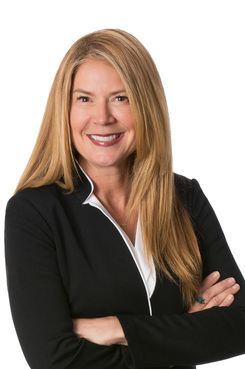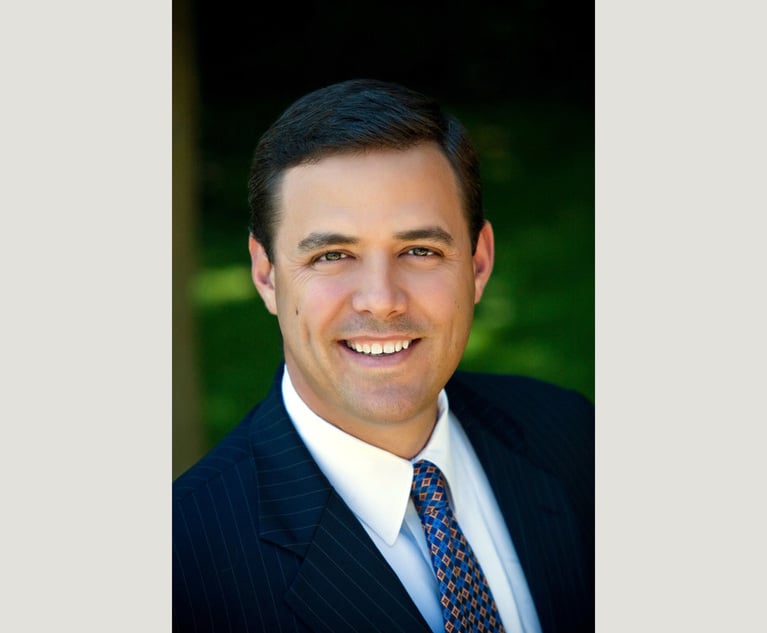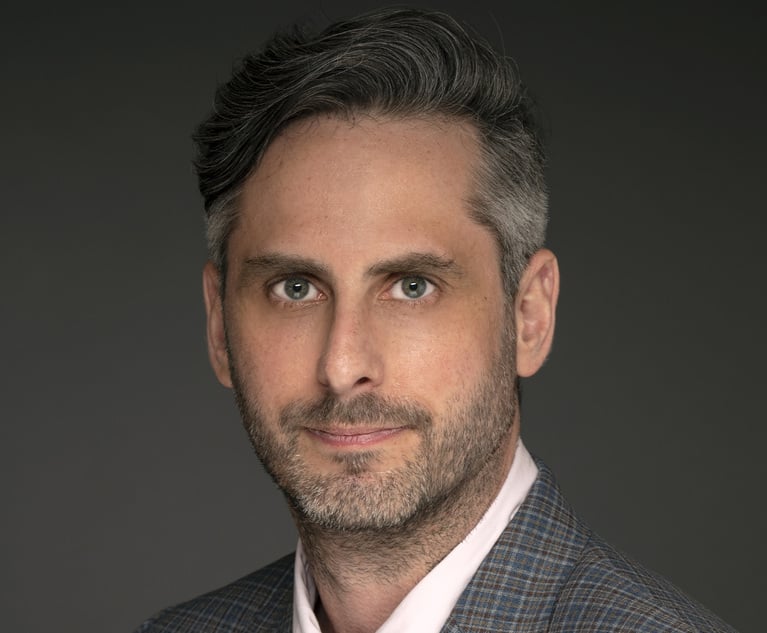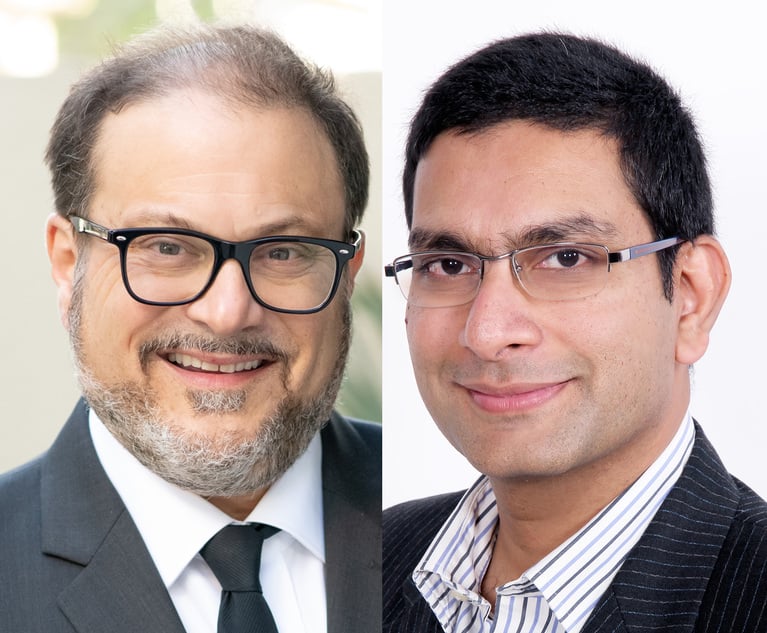Venues, Eligibility Bring Uncertainty to Silicon Valley IP Practices, Winston & Strawn Litigator Says
Kathi Vidal, managing partner of the Silicon Valley office of Winston & Strawn, discusses how her practice has been affected by Supreme Court rulings on IP issues.
September 16, 2019 at 10:53 AM
5 minute read
 Kathi Vidal of Winston & Strawn.
Kathi Vidal of Winston & Strawn.
Since the U.S. Supreme Court's venue-limiting decision in TC Heartland v. Kraft Foods Group Brands, it is clear that there is a significant shift in where patent cases are being filed, with many more cases in Delaware, some in Northern and Central District of California, and a growing number of cases filed in Waco, Texas.
But venue changes are not the only challenge law firm IP practices have been facing. According to Kathi Vidal, a veteran IP litigator and managing partner of the Silicon Valley office of Winston & Strawn, several recent Supreme Court decisions have created uncertainty with respect to patent subject matter eligibility—which some argue makes patents too easy to invalidate and discourages innovation. How these issues evolve could have a great effect on innovative companies, and the IP practices that serve their legal needs.
The Recorder caught up with Vidal at the 2019 Disruptive Technologies Legal Summit at Santa Clara University, to hear more about her observations of the changing landscape in IP litigation.
Editor's note: Vidal's answers have been edited for length, style and clarity.
Q: How have things changed after the TC Heartland decision? What is your observation?
Vidal: Everybody thought cases were going to go to Delaware, because they really thought it was all going to be based on incorporation. And what we have predicted is, based on your personal place of business and where the activities were, that we'd see a lot more cases in the Northern District of California.
We did a survey of all the companies in the Northern District and where they were incorporated and where their businesses were. And what we found was there was a lot of business in the Northern District and in the Central District. So we predicted that based on that factor, a lot of cases would be coming either to the Northern District or the Central. And the one thing that caused a deviation from all that is really Waco in the Western District of Texas, because that was a sleeper at the time TC Heartland came around. [There has been] a huge uptick of cases that are filed down in Texas, in this case, Western District versus these other jurisdictions.
How have venue changes impacted your practice?
It hasn't impacted my practice because I litigate throughout the country, so I've never focused just on cases in the Northern District of California. And I think that's true for a number of lawyers. When the cases were primarily filed in Delaware and in the Eastern District of Texas, a lot of my cases [used to be] there. I represent a lot of clients in Silicon Valley, but I represent them no matter where they're sued.
Other than the TC heartland decision, are there any other trends have you observed with regard to IP litigation?
Other than TC Heartland, I would say it's a law around patent eligibility, which is called 101, it is the provision, that 35 U.S.C. § 101.
The way that law is being interpreted, is in such a way that many patents are being construed as being invalid. So that's the dilemma. So, there are many fewer cases being brought because the risk of bringing a case is higher. Because if you bring a case now, your patent might be killed early on, and you lose your asset. And you don't win the case. You wasted your asset, for no reason. Now, I do think that's going to change.
How and when do you think it will change?
It could happen anytime this year. So, the Supreme Court goes back into session in October, and there are cases in the queue. [If the justices] choose to hear on cert, that could dramatically change the law. That's probably the quickest way it'll change. There's also been testimony before Congress, there were two days of testimony … where a lot of companies have spoken up and said the law is broken [because] the law does not protect these emerging disruptive technologies.
Because right now, under the current law, it's difficult to have a patent on something that's, for example, [artificial intelligence] running on a computer. Even if you did [patent it], the courts would likely strike it as being patent ineligible. So, the companies have stepped forward and said the law needs to change, [and even] the Federal Circuit itself [has said so].
What do you see as the biggest challenge for IP litigation going forward?
I do think the law around [35 U.S.C. § 101] is the biggest challenge in not just where the law is right now, but coming up with laws that strike the right balance between protecting real innovation [and] allowing so many patents that there's no space to innovate. And that's going to be impacted not only by the actual Supreme Court and legislature in the way they evolve it, but [also by] some of these newer technologies like AI, [which] are going to challenge that system.
This content has been archived. It is available through our partners, LexisNexis® and Bloomberg Law.
To view this content, please continue to their sites.
Not a Lexis Subscriber?
Subscribe Now
Not a Bloomberg Law Subscriber?
Subscribe Now
NOT FOR REPRINT
© 2025 ALM Global, LLC, All Rights Reserved. Request academic re-use from www.copyright.com. All other uses, submit a request to [email protected]. For more information visit Asset & Logo Licensing.
You Might Like
View All
How I Made Office Managing Partner: 'Stay Focused on Building Strong Relationships,' Says Joseph Yaffe of Skadden

US Patent Innovators Can Look to International Trade Commission Enforcement for Protection, IP Lawyers Say

How the Deal Got Done: Sidley Austin and NWSL Angel City Football Club/Iger
Trending Stories
- 1Decision of the Day: Court Holds Accident with Post Driver Was 'Bizarre Occurrence,' Dismisses Action Brought Under Labor Law §240
- 2Judge Recommends Disbarment for Attorney Who Plotted to Hack Judge's Email, Phone
- 3Two Wilkinson Stekloff Associates Among Victims of DC Plane Crash
- 4Two More Victims Alleged in New Sean Combs Sex Trafficking Indictment
- 5Jackson Lewis Leaders Discuss Firm's Innovation Efforts, From Prompt-a-Thons to Gen AI Pilots
Who Got The Work
J. Brugh Lower of Gibbons has entered an appearance for industrial equipment supplier Devco Corporation in a pending trademark infringement lawsuit. The suit, accusing the defendant of selling knock-off Graco products, was filed Dec. 18 in New Jersey District Court by Rivkin Radler on behalf of Graco Inc. and Graco Minnesota. The case, assigned to U.S. District Judge Zahid N. Quraishi, is 3:24-cv-11294, Graco Inc. et al v. Devco Corporation.
Who Got The Work
Rebecca Maller-Stein and Kent A. Yalowitz of Arnold & Porter Kaye Scholer have entered their appearances for Hanaco Venture Capital and its executives, Lior Prosor and David Frankel, in a pending securities lawsuit. The action, filed on Dec. 24 in New York Southern District Court by Zell, Aron & Co. on behalf of Goldeneye Advisors, accuses the defendants of negligently and fraudulently managing the plaintiff's $1 million investment. The case, assigned to U.S. District Judge Vernon S. Broderick, is 1:24-cv-09918, Goldeneye Advisors, LLC v. Hanaco Venture Capital, Ltd. et al.
Who Got The Work
Attorneys from A&O Shearman has stepped in as defense counsel for Toronto-Dominion Bank and other defendants in a pending securities class action. The suit, filed Dec. 11 in New York Southern District Court by Bleichmar Fonti & Auld, accuses the defendants of concealing the bank's 'pervasive' deficiencies in regards to its compliance with the Bank Secrecy Act and the quality of its anti-money laundering controls. The case, assigned to U.S. District Judge Arun Subramanian, is 1:24-cv-09445, Gonzalez v. The Toronto-Dominion Bank et al.
Who Got The Work
Crown Castle International, a Pennsylvania company providing shared communications infrastructure, has turned to Luke D. Wolf of Gordon Rees Scully Mansukhani to fend off a pending breach-of-contract lawsuit. The court action, filed Nov. 25 in Michigan Eastern District Court by Hooper Hathaway PC on behalf of The Town Residences LLC, accuses Crown Castle of failing to transfer approximately $30,000 in utility payments from T-Mobile in breach of a roof-top lease and assignment agreement. The case, assigned to U.S. District Judge Susan K. Declercq, is 2:24-cv-13131, The Town Residences LLC v. T-Mobile US, Inc. et al.
Who Got The Work
Wilfred P. Coronato and Daniel M. Schwartz of McCarter & English have stepped in as defense counsel to Electrolux Home Products Inc. in a pending product liability lawsuit. The court action, filed Nov. 26 in New York Eastern District Court by Poulos Lopiccolo PC and Nagel Rice LLP on behalf of David Stern, alleges that the defendant's refrigerators’ drawers and shelving repeatedly break and fall apart within months after purchase. The case, assigned to U.S. District Judge Joan M. Azrack, is 2:24-cv-08204, Stern v. Electrolux Home Products, Inc.
Featured Firms
Law Offices of Gary Martin Hays & Associates, P.C.
(470) 294-1674
Law Offices of Mark E. Salomone
(857) 444-6468
Smith & Hassler
(713) 739-1250







